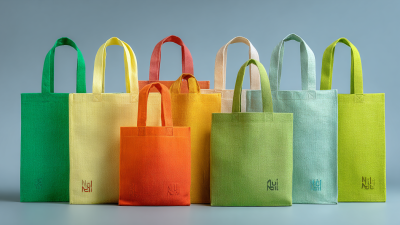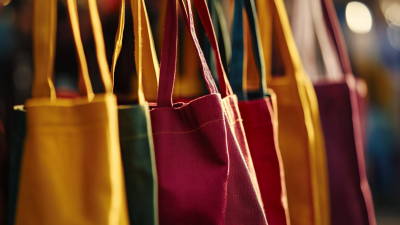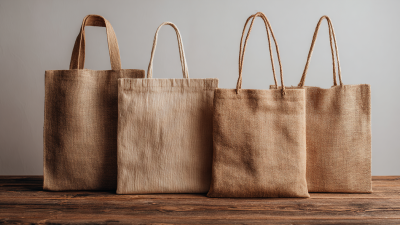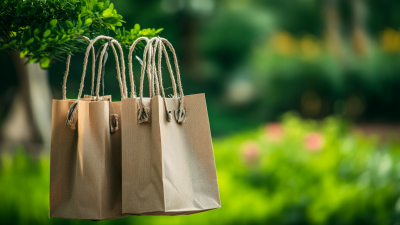How to Choose the Perfect Cloth Bags for Your Eco Friendly Lifestyle
In an era where sustainability has become a critical focus, choosing the right Cloth Bags is essential for anyone looking to embrace an eco-friendly lifestyle. According to a report by the Environmental Protection Agency, single-use plastic bags contribute to over 300 million tons of plastic waste annually, posing significant threats to marine life and ecosystems. Additionally, a 2021 study from the World Economic Forum indicated that if current production and consumption trends continue, there could be more plastic than fish in the ocean by 2050. As consumers become more conscious of their environmental impact, the demand for durable, reusable Cloth Bags is on the rise. These bags not only reduce reliance on harmful plastics but also embody a commitment to sustainable practices. This blog will guide you through the process of selecting the perfect Cloth Bags that align with both your values and lifestyle, ensuring you make a positive impact on the planet.

The Environmental Impact of Single-Use Plastics and the Need for Cloth Bags
The Environmental Impact of Single-Use Plastics and the Need for Cloth Bags
Single-use plastics have become ubiquitous in our daily lives, contributing significantly to environmental degradation. According to a report from the United Nations, approximately 300 million tons of plastic waste is produced each year, with a staggering portion of this being single-use items like shopping bags. Research indicates that about 1 trillion plastic bags are used worldwide annually, most of which end up in landfills or the ocean, where they can take up to 1,000 years to decompose. This accumulation not only leads to pollution but also harms marine life, with studies revealing that over 100,000 marine animals die each year due to plastic ingestion.
In response to this growing crisis, cloth bags have emerged as a sustainable alternative. A study conducted by the World Economic Forum highlighted that switching from single-use plastic bags to cloth alternatives could reduce plastic waste by over 500 billion bags annually. Cloth bags, typically made from materials like organic cotton or recycled polyester, are reusable and highly durable. The environmental benefits are compelling; cloth bags can replace over 600 single-use plastic bags throughout their lifespan. By opting for cloth bags, consumers can significantly mitigate their carbon footprint and contribute to a more sustainable lifestyle, showcasing a vital step in the fight against plastic pollution.
Understanding Different Types of Cloth Bags and Their Material Benefits
When embracing an eco-friendly lifestyle, the choice of cloth bags plays a crucial role in reducing environmental impact. There are various types of cloth bags available, each with distinct materials that offer unique benefits. According to a report by the Environmental Protection Agency, single-use plastic bags contribute significantly to pollution, with up to 1 trillion plastic bags used globally each year. Choosing reusable cloth bags can dramatically decrease this waste, making materials like cotton, hemp, and recycled polyester standout options for sustainability enthusiasts.
Cotton bags, though slightly more resource-intensive in terms of water usage, provide durability and a natural feel that many consumers prefer. Research from the Soil Association indicates that organic cotton production can use up to 91% less water than conventional processes. On the other hand, hemp bags are known for their strength and longevity; they require minimal pesticides and produce fibers that are naturally resistant to mold and UV light. Lastly, recycled polyester bags use post-consumer plastic bottles, effectively diverting waste from landfills. A study published in the Journal of Cleaner Production found that using recycled polyester can save approximately 60% of the energy needed to produce virgin polyester. By understanding the distinct advantages of these materials, consumers can make informed choices that align with their eco-conscious values.

Key Factors to Consider When Choosing Cloth Bags for Everyday Use
When selecting the perfect cloth bags for an eco-friendly lifestyle, several key factors come into play to ensure you make the best choice for everyday use. First and foremost, consider the fabric material. Look for bags made of organic cotton, hemp, or recycled polyester, as these options are not only durable but also more sustainable compared to conventional materials. A good cloth bag should be capable of withstanding daily wear and tear while being biodegradable or recyclable at the end of its life cycle.

Another crucial element to think about is the size and design of the bag. Opt for versatile bags that can cater to different needs, whether for grocery shopping, gym visits, or daily errands. A bag with multiple compartments can help in organizing your essentials better. Additionally, pay attention to the straps and handles; they should be sturdy and comfortable for prolonged use. Accessibility and ease of storage are also vital—choose bags that can be folded compactly when not in use. By keeping these factors in mind, you can effortlessly integrate cloth bags into your eco-friendly routine.
Design and Durability: How to Select Cloth Bags That Last
When selecting cloth bags for an eco-friendly lifestyle, it’s crucial to focus on both design and durability. According to a report by the Environmental Protection Agency, reusable bags can reduce plastic waste significantly, with research indicating that a single cloth bag can replace up to 1,000 plastic bags over its lifetime. This stark contrast highlights the importance of choosing bags made from high-quality materials that can withstand daily use.
When considering design, opt for bags that suit your needs, whether for grocery shopping, beach outings, or daily errands. Look for features such as reinforced stitching and heavy-duty fabrics like cotton or jute. A study from the Sustainable Packaging Coalition suggests that these materials not only contribute to the longevity of the bag but also minimize environmental impact.
**Tips**: Prioritize bags with a design that accommodates your lifestyle, and consider those with added features like pockets or insulated linings for versatility. Also, always check for certifications, indicating the bag's eco-friendly status to ensure your choice supports sustainable practices. By investing in durable cloth bags with smart designs, you can better adhere to your commitment to an eco-friendly lifestyle.
How to Choose the Perfect Cloth Bags for Your Eco Friendly Lifestyle - Design and Durability: How to Select Cloth Bags That Last
| Type of Cloth Bag | Material | Durability (Years) | Design Options | Eco Ratings |
|---|---|---|---|---|
| Reusable Shopping Bag | Cotton Canvas | 5-10 | Various Colors and Prints | A+ |
| Produce Bag | Muslin | 3-5 | Natural, Simple Designs | A |
| Tote Bag | Recycled Polyester | 4-6 | Stylish Prints and Patterns | B+ |
| Gym Bag | Denim | 5+ | Casual and Trendy | A |
| Lunch Bag | Insulated Fabric | 4-8 | Creative Designs | A+ |
The Role of Cloth Bags in Promoting Sustainable Consumer Practices
Cloth bags play a pivotal role in promoting sustainable consumer practices, significantly reducing our reliance on single-use plastics. According to a study by the Ellen MacArthur Foundation, switching to reusable bags could eliminate 200 plastic bags per person per year, resulting in billions of fewer bags in circulation. This shift not only reduces waste but also conserves resources—producing a single cotton bag uses 84% less energy compared to the equivalent number of plastic bags used over its lifetime.
When choosing cloth bags, consider their material and durability. Opt for organic cotton or recycled polyester, as these options have a lower environmental impact. Look for bags that are designed for longevity, as this will ensure they can withstand repeated use. Additionally, many brands now offer certifications to verify their sustainability practices, which can guide consumers in making informed decisions.
Tip: Always carry a cloth bag with you to avoid impulse purchases that might lead to using plastic bags. Also, when shopping, select bags with multiple compartments for better organization, making it easier to separate different types of items and reducing the chance of needing additional bags.
Related Posts
-

How to Adapt Best Reusable Bags for 2025 Technological Innovations in Global Sourcing
-

Understanding Industry Standards for the Best Tote Bags: A Guide to Choosing the Right One
-

Exploring 5 Innovative Types of Eco Friendly Bags: A Look at Industry Trends and Sustainability Impact
-

Exploring Sustainable Alternatives to Tote Bags for Eco-Conscious Buyers
-

The Future of Sustainable Shopping with Best Eco Friendly Tote Bags
-

Understanding Industry Standards for the Best Eco Friendly Shopping Bags
